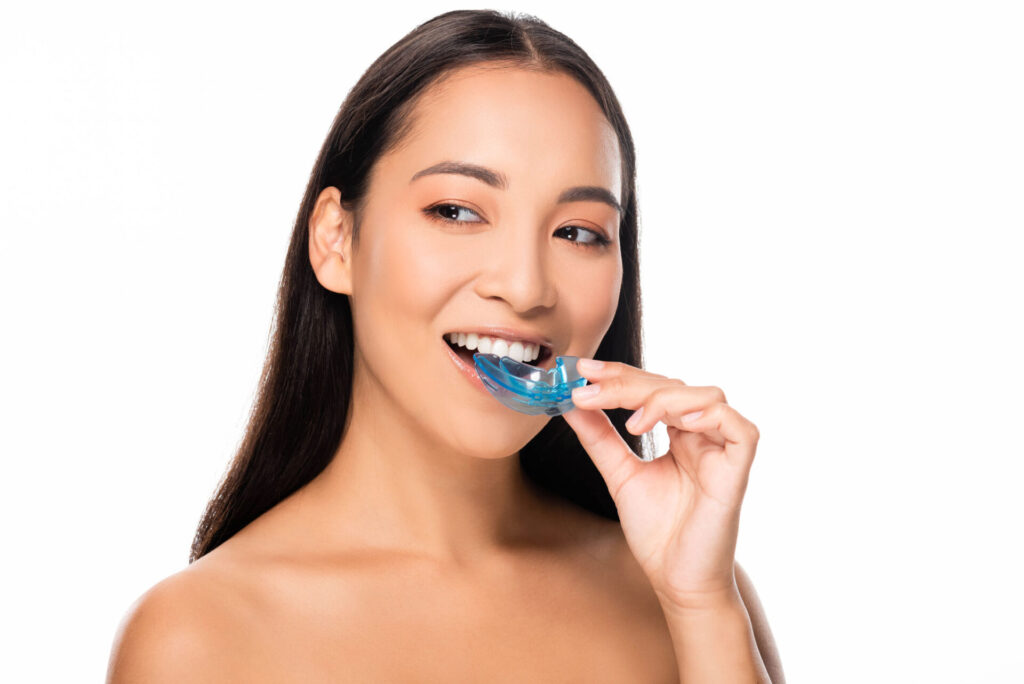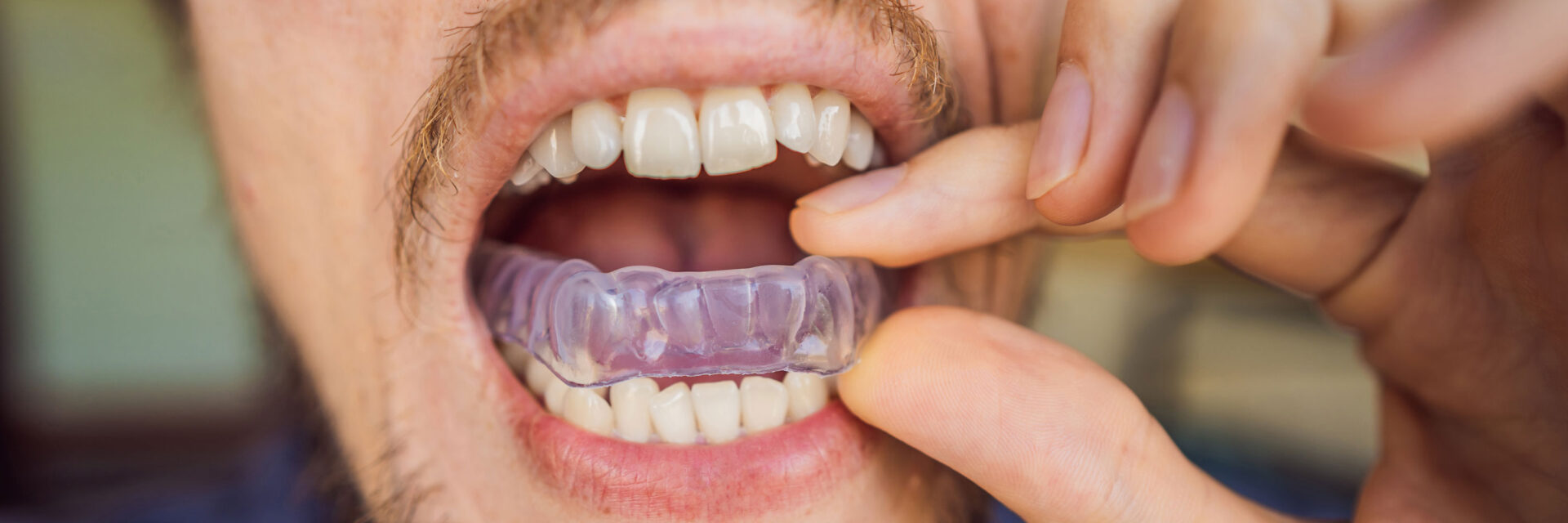Bruxism, or teeth grinding, is a condition characterized by the involuntary clenching and grinding of teeth. It can result in dental complications, including tooth damage, jaw discomfort, and headaches.
Night guards, whether custom fit or stock mouthguards, effectively alleviate bruxism symptoms because they serve as a protective barrier, prevent direct contact between the lower and upper teeth, absorb the grinding force, and reduce pressure on the teeth and jaw muscles.
Particularly beneficial for sleep bruxism patients, dentists should recommend night guards to address the underlying cause and ensure appropriate treatment.
 Night guards, also known as occlusal guards, are dental appliances designed to protect the teeth and jaws from the harmful effects of teeth grinding or bruxism during sleep.
Various types of night guards are available, including custom-made, boil-and-bite, and over-the-counter guards, each offering different levels of comfort and protection.
Night guards, also known as occlusal guards, are dental appliances designed to protect the teeth and jaws from the harmful effects of teeth grinding or bruxism during sleep.
Various types of night guards are available, including custom-made, boil-and-bite, and over-the-counter guards, each offering different levels of comfort and protection.
 Let’s focus here on the three key points about the benefits of a night guard for teeth grinding: pain relief, protection of teeth from damage, and the potential to avoid extensive dental treatments.
Let’s focus here on the three key points about the benefits of a night guard for teeth grinding: pain relief, protection of teeth from damage, and the potential to avoid extensive dental treatments.
 Night guards play a crucial role in managing severe bruxism by providing a protective barrier between the upper and lower teeth, thereby reducing the adverse effects of teeth grinding. Bruxism, or the clenching and grinding of teeth, can lead to various dental issues such as tooth wear, fractures, and temporomandibular joint (TMJ) disorders.
And although some types of guards offer better protection than others, it all depends on each case and what your physician determines. Be it a boil-and-bite night guard, a custom mouth guard, a splint, or a custom fit night guard, these are all essential tools when eliminating bruxism.
Night guards or any other oral appliances, like an occlusal guard or a custom mouth guard for bruxism, are essential for helping people with bruxism, as they provide a non-invasive and effective solution to prevent further dental complications and improve the individual’s overall well-being.
It is crucial to consult with a dentist to determine the underlying cause of bruxism and ensure that a night guard is the appropriate treatment option.
Night guards play a crucial role in managing severe bruxism by providing a protective barrier between the upper and lower teeth, thereby reducing the adverse effects of teeth grinding. Bruxism, or the clenching and grinding of teeth, can lead to various dental issues such as tooth wear, fractures, and temporomandibular joint (TMJ) disorders.
And although some types of guards offer better protection than others, it all depends on each case and what your physician determines. Be it a boil-and-bite night guard, a custom mouth guard, a splint, or a custom fit night guard, these are all essential tools when eliminating bruxism.
Night guards or any other oral appliances, like an occlusal guard or a custom mouth guard for bruxism, are essential for helping people with bruxism, as they provide a non-invasive and effective solution to prevent further dental complications and improve the individual’s overall well-being.
It is crucial to consult with a dentist to determine the underlying cause of bruxism and ensure that a night guard is the appropriate treatment option.
What is Bruxism?
Bruxism is a condition characterized by the habitual and involuntary grinding or clenching of teeth. It typically occurs during sleep but can also happen while awake and in the daytime. It can be mild or severe, and its causes are not completely understood. However, we know that stress, anxiety, misaligned teeth, and certain medications contribute to its development. Over time, this condition can lead to severe teeth damage, jaw pain, headaches, and other complications. Treatments for bruxism aim to alleviate symptoms, protect the teeth, and address any underlying causes, like stress and anxiety.The Two Types of Bruxism
bruxism can be classified into two types: awake bruxism and sleep bruxism.Sleep Bruxism
Sleep bruxism, also commonly referred to as teeth grinding, is a sleep disorder characterized by the habitual clenching or grinding of teeth during sleep. This condition often occurs unknowingly, making it difficult for individuals to control or prevent. Sleep bruxism can cause various symptoms, including jaw pain, headaches, tooth sensitivity, and even damage to the teeth and jaw. Among the factors for sleep bruxism are stress, anxiety, sleep apnea, misaligned teeth or bites, and even gastroesophageal reflux disease (GERD.) Treatment options for sleep bruxism typically involve carrying out a sleep study to diagnose and determine the severity, then using mouth guards or splints to protect the teeth and alleviate symptoms.Awake Bruxism
Awake bruxism refers to the involuntary grinding, clenching, or gnashing of teeth that occurs during wakefulness. Unlike sleep bruxism which occurs during sleep, awake bruxism happens while a person is fully conscious. Although it’s considered a distinct condition, it is the most common of the two types. It is also associated with stress, anxiety, or tension and can have many of the same dangers as sleep bruxism, but as it affects a person during the day, it can be more easily prevented once the patient realizes they have the condition. Mouth guards can effectively treat awake bruxism because they teach the wearer to be more conscious of their grinding and clenching.Night Guards and Teeth Grinding
 Night guards, also known as occlusal guards, are dental appliances designed to protect the teeth and jaws from the harmful effects of teeth grinding or bruxism during sleep.
Various types of night guards are available, including custom-made, boil-and-bite, and over-the-counter guards, each offering different levels of comfort and protection.
Night guards, also known as occlusal guards, are dental appliances designed to protect the teeth and jaws from the harmful effects of teeth grinding or bruxism during sleep.
Various types of night guards are available, including custom-made, boil-and-bite, and over-the-counter guards, each offering different levels of comfort and protection.
What are Night Guards and Mouth Guards?
Night guards, also known as occlusal splints, are typically worn during sleep to prevent the lower and upper teeth from coming into contact with each other. Mouth guards, on the other hand, are protective devices primarily used during contact sports or physical activities to prevent dental injuries. While sports mouth guards can be helpful for daytime bruxism, it is not recommended to use them for night. It is important to consult with a dental professional to determine the most appropriate treatment for teeth grinding or bruxism.How They Help With Grinding Your Teeth at Night
Night guards are dental appliances that are designed to help with teeth grinding and clenching. They act as a protective barrier between both sets of teeth, preventing them from smashing against each other. By creating a cushioning effect, night guards help to distribute the force from the grind, reducing its impact on the teeth and jaw muscles. This helps to prevent and alleviate headaches, tooth damage, and even jaw pain and soreness. It is important to understand that while night guards can help eliminate the symptoms of night teeth grinding, they may not completely eliminate the underlying factors for sleep bruxism. They can complement other forms of treatment like relaxation techniques, therapy for emotional issues, anti-anxiety drugs, or muscle relaxants. These appliances are typically made of a soft material that molds to the shape of the teeth, providing a comfortable fit.Types of Night Guards Available
Several types of dental appliances available can help alleviate the symptoms associated with teeth grinding.1. Custom Night Guard
Made specifically for an individual’s mouth. Custom-fitted night guards are made by a dental professional to fit the unique shape and size of the patient’s teeth.2. Dental Night Guard
Typically available over-the-counter and can be purchased without a prescription. They are pre-made and come in different sizes to fit various mouth shapes.3. Boil and Bite Night Guard
This type can be customized at home. It is made by dipping the guard in hot water until boiling and then biting into it to create a dental impression.4. Soft Night Guard
A soft night guard is made from a pliable material that provides cushioning and comfort while protecting the teeth from grinding. These are common for cases of mild bruxism.5. Dual Laminate Night Guard.
A dual laminate night guard, also known as a bilaminar splint, is a dental device that can be used to help treat severe forms of teeth grinding. They are two layers of ethylene-vinyl acetate, with one being a soft inner layer and the other a harder outer one. These are a bit more expensive but also longer-lasting than soft night guards or simple store-bought ones, but they could also be more uncomfortable for many, even if it’s custom-fit.6. Mandibular Advancement Device
A mandibular advancement device (MAD) is a dental appliance that is designed to mainly treat snoring and obstructive sleep apnea in adults but has also proven effective for treating nighttime teeth grinding caused by sleep disorders. It works by repositioning the lower jaw in a forward position, which helps to open up the airway space and prevent it from collapsing during sleep. The device is made to custom fit the individual’s dental structure and is usually made of plastic or acrylic material. By keeping the airway open, the mandibular advancement device allows for improved airflow and reduces the likelihood of snoring or experiencing pauses in breathing during sleep. When considering any type of night guard, it is essential to consult with a dental professional to determine the most suitable option for individual needs.6. NTI-tss TMD Device
The NTI-tss Plus, also known as the Nociceptive Trigeminal Inhibition Tension Suppression System, is a drug-free alternative for treating migraine pain derived from jaw and teeth grinding problems. According to the Migraine Research Foundation, in the United States alone, over 30 million people suffer from migraines, providing dental clinicians with an opportunity to help their patients find relief. Even though it’s relatively new to the market, the device has already shown such promise that it has received FDA clearance for preventing migraines and tension-type headaches, with one study proving it can reduce clenching forces by around 70% and 82% of migraine sufferers experienced a 77% decrease in migraine events when using the NTI-tss Plus.Benefits of A Night Guard for Teeth Grinding
 Let’s focus here on the three key points about the benefits of a night guard for teeth grinding: pain relief, protection of teeth from damage, and the potential to avoid extensive dental treatments.
Let’s focus here on the three key points about the benefits of a night guard for teeth grinding: pain relief, protection of teeth from damage, and the potential to avoid extensive dental treatments.
Pain Relief
To alleviate the discomfort caused by teeth grinding or bruxism, night guards have been found to provide pain relief by simply reducing the pressure on the jaw from too much grinding and clenching. This immediately has an effect after a single sleep session and the morning after. Night guards also provide support for the temporomandibular joint (TMJ), alleviating any pain or discomfort associated with TMJ by reducing the strain placed on the joint during grinding.Protect Teeth From Damage
Night guards act as a protective barrier that prevents worn and fractured teeth and tooth enamel damage from the grinding or clenching of teeth. These oral appliances are some of the best tools for preventing damaged teeth and tooth pain.Avoid Extensive Dental Treatments
By utilizing custom-made oral appliances, from dental guards to splints, designed to absorb the pressure from jaw clenching and grinding, individuals can prevent tooth loss, tooth enamel damage, and even TMJ disorder, avoiding the need for extensive dental treatments in the future. This is especially motivating when looking at the cost of restorative dentistry. It is much more cost-effective to prevent serious teeth damage than to pay for dentures or dental surgery.Bruxism Symptoms and Causes
The symptoms or signs of bruxism are characterized by the involuntary grinding or clenching of teeth during sleep or while awake. It’s also known as simply teeth grinding and is a common condition that affects many individuals, although it is a more common disorder in children, with almost half of young children likely to experience bruxism at least once. Almost 8% suffer from either mild bruxism or more severe cases. One of the main signs of bruxism is jaw pain, which can range from mild discomfort or soreness to severe pain. Other symptoms may include headaches, tooth sensitivity, and worn-down or loose teeth. The factors for sleep bruxism are various, such as stress, anxiety, obstructive sleep apnea syndrome, and an abnormal bite. It is important to address this as it can lead to dental problems and further complications if left untreated. Seeking professional help is recommended for individuals experiencing bruxism symptoms, as a thorough evaluation and diagnosis can help determine the best treatment approach to alleviate jaw pain and prevent further damage.Dangers of Not Treating Bruxism
Untreated bruxism, no matter how mild the case may be, can seriously threaten an individual’s health and quality of life.Tooth Damage
Damaged teeth and enamel are common consequences of untreated bruxism, and understanding the potential harm to the teeth is crucial in promoting effective treatment strategies. The four key ways in which tooth damage appears are:- Enamel erosion: The constant grinding motion can wear down the protective enamel layer, leaving the teeth vulnerable to decay and sensitivity.
- Cracked and broken teeth: Excessive pressure from grinding can lead to dental cracks or fractures, which may require extensive dental work to repair.
- Tooth sensitivity: Grinding can expose the underlying dentin, leading to increased sensitivity to hot, cold, or acidic foods and drinks.
- Bite problems: It can lead to misaligned teeth, leading to further bite problems like biting off the mouth’s soft tissues (cheek and tongue.)
Jaw Pain and Muscle Tension
Jaw pain and muscle tension are common symptoms associated with the condition of teeth grinding. Individuals who grind their teeth may experience discomfort or soreness in their jaw joints, headaches, and neck or shoulder pain. The constant strain on the jaw muscles can also contribute to temporomandibular joint disorder (TMJ) development. Night guards, a commonly recommended treatment for bruxism, can help alleviate jaw pain and muscle tension by providing a cushioning effect.Facial Pain
In addition to jaw pain and muscle tension, another common symptom is facial pain. This can manifest as discomfort or soreness in various areas of the face, such as the temples, cheeks, or even the ears. Facial pain caused by bruxism is typically a result of the excessive strain placed on the jaw muscles during grinding or clenching episodes.Psychological Problems
Not only does the constant gnashing and grinding of teeth cause health issues, but not tackling the causes and risk factors can also be dangerous in the long term. The risk factors of bruxism can be psychological issues like chronic stress and anxiety, which, if left untreated, can have effects on more than just your dental health.Why Night Guards Are Essential for Severe Bruxism
 Night guards play a crucial role in managing severe bruxism by providing a protective barrier between the upper and lower teeth, thereby reducing the adverse effects of teeth grinding. Bruxism, or the clenching and grinding of teeth, can lead to various dental issues such as tooth wear, fractures, and temporomandibular joint (TMJ) disorders.
And although some types of guards offer better protection than others, it all depends on each case and what your physician determines. Be it a boil-and-bite night guard, a custom mouth guard, a splint, or a custom fit night guard, these are all essential tools when eliminating bruxism.
Night guards or any other oral appliances, like an occlusal guard or a custom mouth guard for bruxism, are essential for helping people with bruxism, as they provide a non-invasive and effective solution to prevent further dental complications and improve the individual’s overall well-being.
It is crucial to consult with a dentist to determine the underlying cause of bruxism and ensure that a night guard is the appropriate treatment option.
Night guards play a crucial role in managing severe bruxism by providing a protective barrier between the upper and lower teeth, thereby reducing the adverse effects of teeth grinding. Bruxism, or the clenching and grinding of teeth, can lead to various dental issues such as tooth wear, fractures, and temporomandibular joint (TMJ) disorders.
And although some types of guards offer better protection than others, it all depends on each case and what your physician determines. Be it a boil-and-bite night guard, a custom mouth guard, a splint, or a custom fit night guard, these are all essential tools when eliminating bruxism.
Night guards or any other oral appliances, like an occlusal guard or a custom mouth guard for bruxism, are essential for helping people with bruxism, as they provide a non-invasive and effective solution to prevent further dental complications and improve the individual’s overall well-being.
It is crucial to consult with a dentist to determine the underlying cause of bruxism and ensure that a night guard is the appropriate treatment option. 
